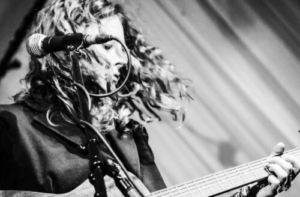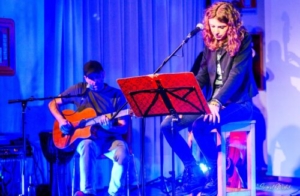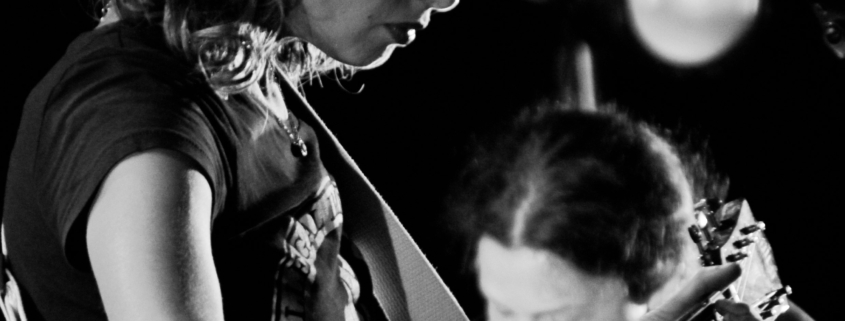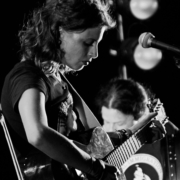Il viaggio di Zohra di Nicole Coceancig
by Franco Giordani – instArt.info
 recent years, several young musicians have given strength and value to the Friulian language in the regional music scene, exporting it beyond the borders of the Piccola Patria. Among these, Alvise Nodale, who has received prestigious national awards for his Gòtes, Massimo Silverio, and Nicole Coceancig, a singer-songwriter originally from Premariacco who now lives in Carnia and has an extraordinary voice, are certainly worth mentioning. I remember when I first met her, I was immediately struck by her energy and her unmistakable voice. One day, I told her an anecdote I had read in Johnny Cash’s official autobiography. The American artist says, “I am grateful for my gift: my mother always called my voice a gift”. This is Nicole’s distinctive feature, the gift of having a tone of voice that you may or may not like, but which remains unique, different from all the others you hear around you. But that’s not all, of course. Her poetics are marked by a firm conviction to spread messages of civil commitment. From the very beginning, the influence of Fabrizio De Andrè has been strongly felt in her musical writing, starting with “F”, her first work composed of nine songs in Italian. She has collaborated with numerous other artists, both in the musical and literary fields; one could say that Nicole is tireless. Every new artistic encounter is an enrichment and a new beginning for her. Her long collaboration with Leo Virgili has resulted in her new album, which received the prestigious Ciampi 2024 Award, published by Valter Colle‘s Nota label. The album, developed as a concept, tells the story of a young woman from Pakistan who arrives in Europe. As highlighted in the album presentation on the website www.nota.it, Nicole’s voice is capable of immediately bringing us back to physical reality, made of flesh, hair, pupils and blisters, which transcends the muffled digital bubble into which we have fallen. The sounds, skilfully calibrated by Leo Virgili, greatly emphasise the multi-hued timbre of the Friulian singer-songwriter. It is an album that recounts a painful journey full of obstacles and suffering, but also characterised by great tenacity and an immense will to live. It is a story that borders on and intersects with that told by writer Antonella Sbuelz in her novel “Questa sera non torno” (I’m not coming back tonight), published in 2021 by Feltrinelli. Antonella Sbuelz and Nicole have also shared the stage at a number of cultural events, cultivating the invitation to go on a profound search for love and humanity. Zohra‘s booklet is part of the Block Nota series and contains introductory contributions by Loris Vescovo, Mojra Bearzot, Sara Rosso and Angelo Floramo, some of whose observations are worth highlighting. Loris Vescovo writes that listening surprises and shocks with the power of its simplicity. Angelo Floramo emphasises that there are many reasons why “one must go”: war, hunger, discrimination, the gagging of some tyrannies and the shadows of those who flee pass by the hedges of our indifference. According to Sara Rosso, telling the story of humanity and putting people back at the centre in this long night that seems never-ending is the stuff of very courageous artists. Mojra Bearzot observes that Zohra rebels against a predetermined fate, finding the courage to raise her head and say no. She sets out for herself, for all her sisters, for her mother. In addition to Nicole and Leo Virgili, Giacomo Iacuzzo (percussion), Marco Tondon (double bass), Davide Raciti (violin), Riccardo Pes (cello) and Federico Pascucci (ney) participated in the recording of the album at the Invisibles Recordings studio in Premariacco. Zohra’s musical journey is so dense that it is exhausted in just eight pieces and, before the finale, it intersects with a Carnic legend that tells the story of Silverio, a man accused of embezzling a piece of land in Monte Moscardo: “And who knows what will become of us / people without a home, without a name / abandoned, running after a dream / But we, like the moon / will belong to no one”. I always encourage music lovers to buy albums and not limit themselves to listening to them on digital platforms, especially when an album is so well structured and composed, with lyrics, translations, illustrations (in this case by Sofia Cappello) and external contributions. So, anyone who wants to learn more about Nicole should know that her CD can be purchased by contacting the artist on social media or on the Nota label website www.nota.it. I thought that the best way to present the work would be through this exchange of observations directly with the author.
recent years, several young musicians have given strength and value to the Friulian language in the regional music scene, exporting it beyond the borders of the Piccola Patria. Among these, Alvise Nodale, who has received prestigious national awards for his Gòtes, Massimo Silverio, and Nicole Coceancig, a singer-songwriter originally from Premariacco who now lives in Carnia and has an extraordinary voice, are certainly worth mentioning. I remember when I first met her, I was immediately struck by her energy and her unmistakable voice. One day, I told her an anecdote I had read in Johnny Cash’s official autobiography. The American artist says, “I am grateful for my gift: my mother always called my voice a gift”. This is Nicole’s distinctive feature, the gift of having a tone of voice that you may or may not like, but which remains unique, different from all the others you hear around you. But that’s not all, of course. Her poetics are marked by a firm conviction to spread messages of civil commitment. From the very beginning, the influence of Fabrizio De Andrè has been strongly felt in her musical writing, starting with “F”, her first work composed of nine songs in Italian. She has collaborated with numerous other artists, both in the musical and literary fields; one could say that Nicole is tireless. Every new artistic encounter is an enrichment and a new beginning for her. Her long collaboration with Leo Virgili has resulted in her new album, which received the prestigious Ciampi 2024 Award, published by Valter Colle‘s Nota label. The album, developed as a concept, tells the story of a young woman from Pakistan who arrives in Europe. As highlighted in the album presentation on the website www.nota.it, Nicole’s voice is capable of immediately bringing us back to physical reality, made of flesh, hair, pupils and blisters, which transcends the muffled digital bubble into which we have fallen. The sounds, skilfully calibrated by Leo Virgili, greatly emphasise the multi-hued timbre of the Friulian singer-songwriter. It is an album that recounts a painful journey full of obstacles and suffering, but also characterised by great tenacity and an immense will to live. It is a story that borders on and intersects with that told by writer Antonella Sbuelz in her novel “Questa sera non torno” (I’m not coming back tonight), published in 2021 by Feltrinelli. Antonella Sbuelz and Nicole have also shared the stage at a number of cultural events, cultivating the invitation to go on a profound search for love and humanity. Zohra‘s booklet is part of the Block Nota series and contains introductory contributions by Loris Vescovo, Mojra Bearzot, Sara Rosso and Angelo Floramo, some of whose observations are worth highlighting. Loris Vescovo writes that listening surprises and shocks with the power of its simplicity. Angelo Floramo emphasises that there are many reasons why “one must go”: war, hunger, discrimination, the gagging of some tyrannies and the shadows of those who flee pass by the hedges of our indifference. According to Sara Rosso, telling the story of humanity and putting people back at the centre in this long night that seems never-ending is the stuff of very courageous artists. Mojra Bearzot observes that Zohra rebels against a predetermined fate, finding the courage to raise her head and say no. She sets out for herself, for all her sisters, for her mother. In addition to Nicole and Leo Virgili, Giacomo Iacuzzo (percussion), Marco Tondon (double bass), Davide Raciti (violin), Riccardo Pes (cello) and Federico Pascucci (ney) participated in the recording of the album at the Invisibles Recordings studio in Premariacco. Zohra’s musical journey is so dense that it is exhausted in just eight pieces and, before the finale, it intersects with a Carnic legend that tells the story of Silverio, a man accused of embezzling a piece of land in Monte Moscardo: “And who knows what will become of us / people without a home, without a name / abandoned, running after a dream / But we, like the moon / will belong to no one”. I always encourage music lovers to buy albums and not limit themselves to listening to them on digital platforms, especially when an album is so well structured and composed, with lyrics, translations, illustrations (in this case by Sofia Cappello) and external contributions. So, anyone who wants to learn more about Nicole should know that her CD can be purchased by contacting the artist on social media or on the Nota label website www.nota.it. I thought that the best way to present the work would be through this exchange of observations directly with the author.

Nicole, first of all: Zohra’s writing required a lot of energy and passion. It seems that every word has been thought out and weighed as if it were definitive. Is that the case? Dear Franco, first of all, thank you for these questions you wanted to ask me. My personal creative process does not usually involve changing words: what I write in the first draft remains definitive. This was also the case here, but the process certainly involved much more attention to the words and how they fit together. The theme of “Zohra” is not an easy one, and finding the words that would give it the right weight without becoming too heavy was a goal I set myself from the outset. It wasn’t easy, and I can’t say how it turned out in the end… Obviously, with hindsight, I would have changed a few things, but perhaps it’s fine as it is.
The album was produced by Valter Colle, who said at the CD launch that you feel an urgency to communicate messages of civic engagement. Yes, as well as urgency, I feel a moral duty to do so. I consider myself privileged for many reasons, one of which is the opportunity to get on stage and have people in front of me who have come to listen to me. I feel the need to use that microphone that is always in front of me to say things (always, as you said, messages of civic engagement) that other people, in this way and in these conditions, cannot do even though they would like to. We do wonderful work, but in my opinion, it also imposes responsibilities on us.
You have collaborated with many other artists, both musically and literarily. You also participate in every event that allows you to make new artistic acquaintances. I have been fortunate enough to collaborate with many truly extraordinary artists, including you, Franco. This is one of the things I appreciate most about this job; I find it really stimulating and enriching to share music with other people. In fact, I believe that for me, this is its deepest meaning. In Zohra, one senses your strong emotional involvement with people forced to live on the margins of society.

What do you think of today’s political factions (of all persuasions), of how they manage to create constant divisions to bring people over to their side without getting to the root of today’s critical issues surrounding emigration? Look, this is precisely one of the reasons why Zohra exists. The issue of immigration has always been a sensitive one for me, and at a certain point in my life, I felt the need to explore it in depth in the field. I worked for two years in a community for unaccompanied foreign minors. And just think, as time went by and I learned more, I kept telling myself that until then I had talked a lot, but the truth is that I knew nothing at all. I am telling you this to say that not all of us can know everything, and we cannot expect to. One thing is certain, however: we must ask ourselves questions before anything else. And I am noticing that “Zohra” is making you ask them. I could not be happier or prouder.
In “Di trop che o ai cjaminat” (How far I have walked), there is a very poetic line: “Feet worn down by the seasons / without beginning or end / feet shaped like a man / abandoned to his fate”. In these verses, Zohra tries to describe not only the fatigue and pain of the journey along the Balkan route, but also and above all her condition: Zohra had to disguise herself as a man in order to leave (“Soi partide di gnot, tal scûr / Lassânt il vêl poiât tal liet / i bregons luncs / i cjavei cûrts […]”), because women cannot do so alone; they can do so as daughters, as wives and as mothers, but not alone. Among the very few who try, many are forced to disguise themselves.
In ‘Clamimi par non’ (call me by name) you sing: ‘Call me by name / but do it in the dark / because in this story the light is scarier’. Returning to the previous question… precisely for this reason. Zohra is in disguise and in this song, a hypothetical dialogue with her passeur (human trafficker, the person who is paid a certain fee, not only in money, to get to a specific destination), she asks him to give her the name she wants, the age she needs to be, to take whatever body she wants, but to do it all in the dark, because in this painful story with such a big secret to keep, light is more dangerous than darkness.
You recently received the Suns Europe Festival Award and the prestigious national award dedicated to Piero Ciampi. How rewarding were they for you? I cannot quantify the gratification and gratitude I felt and still feel. Not so much for myself, but for Zohra. Zohra as a person. Knowing that there were people who really listened and chose, too, to give a voice to this girl and her story is the most important thing for me, I would say unsurpassable. The goal of this long and demanding work was to give her a voice… doing it together with others was and still is even more beautiful. I am really lucky.

You have a very busy concert schedule. What do you expect from your shows? Look, I’ll take advantage of this question to announce something: at every presentation of “Zohra”, along with the records, handmade gadgets made by some of my wonderful friends will be sold for a donation; the proceeds from these sales will be donated to Emergency’s bank account for Gaza. On the first evening alone, we collected €170 in donations. So, if there’s one thing I’d like to see happen at the next shows, it’s that people donate to try to help, even if only in a small way, Gaza and the Palestinian people.
An obvious but necessary question. Even though you are very busy promoting Zohra, do you have any plans for the future? I must say that I always have lots of plans for the future, and they vary greatly from one discipline to another. I have never worked on and concentrated on just one project at a time until now; this is challenging, but I think I like it that way.
Thank you, Nicole. Good luck to you and to all the Zohra’s of this world who, now more than ever, need a more aware and humane world.
This post is also available in: Italian





